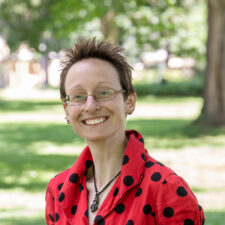Orchid Tierney is Assistant Professor of English at Kenyon College. Her research focuses on the Anthropocene, waste, and waste management in contemporary experimental poetry. She is the author of a year of misreading (Operating System 2019), and her scholarship, reviews, and poetry have appeared in Jacket2, Venti, Fractured Ecologies, and elsewhere.

Authors | Orchid Tierney
Articles on Amodern by Orchid Tierney
AMODERN 10: DISABILITY POETICS
Media, Performance, Technology
The body-mind is a dynamic site on which social, economic, political, and cultural situated experiences are fluidly mapped. Lived experiences of body-minds, including experiences of pain, fatigue, mobility, tension, confusion, anxiety, and depression – invisible and visible disabilities – intersect with and co-consititute inaccessible and accessible environments, media, and technologies. Our body-minds are contested and transformed as our sense of the self extends into computers and software, and into public, private, and commercial spaces.
In this special issue, contributors attend to the intersections of the body-mind with poetry, media, performance, and technology to unpack the meanings of disability and being disabled. The poetics – and politics – of disability makes possible multifarious forms of invention, while challenging received cultural assumptions about body-mind functionality. The contributors engage disability as it informs and is informed by embodied experiences of race, class, kinship, gender, sexuality, and location. Their essays approach the poetics and politics of disability to apprehend the body and mind, while thinking through how language, performance, and technology critically shape both representation and situated experience. This special issue underscores that to stage poetry – and the language we use to examine, describe, study, write, or imagine the poetic object – in relation to a wide spectrum of embodiment and cognition is to critique and reimagine the representations that reduce the disabled body and mind to clinical protocols. How does new media reimagine the interiority of the body-mind? How do sensory experiences expand into technological spaces? Where do ideas of body and mind collide with the transformative context of textual and physical bodies?




